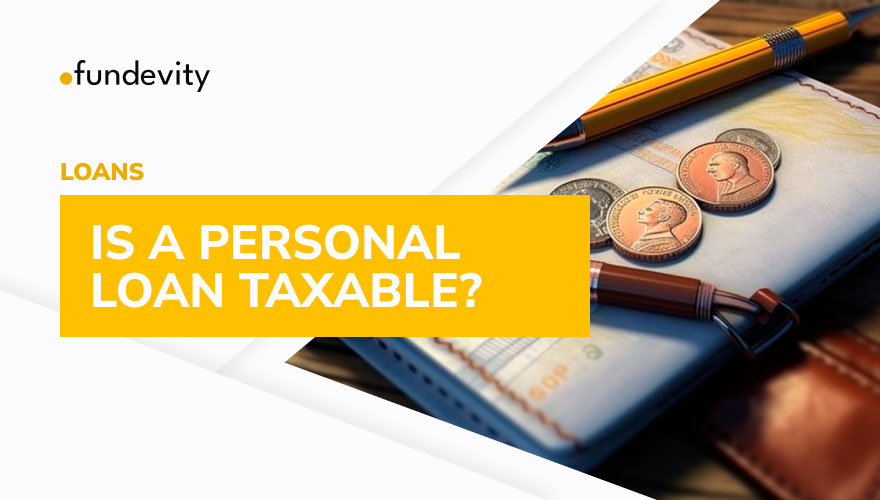Is a Personal Loan Taxable and Can It Be Considered As Income?

Personal loans are often tax-free because the money you receive is not considered income. You must repay the money you borrow, unlike salaries or investment earnings, which you earn and keep.
Personal loans aren’t required to be reported on your income tax return because they aren’t a source of income. This is true whether the money was lent to you by a bank, credit union, peer-to-peer creditor, or another financial organization.
There may be other tax repercussions if you get a personal loan from a friend or household member, but the money will not be taxable income for you.
A personal loan can be used for nearly anything, such as paying for an emergency, a wedding, or house repairs. They’re usually unsecured loans, meaning they don’t demand security to borrow money. Collateral is used to secure secured loans, such as vehicle loans and mortgages.
Loans are not deemed income because income is defined as money earned from a work or through investments. You don’t make money from your loan; instead, you borrow money with the intention of repaying it.
Personal loans are often not taxable. However, there are circumstances when you may be required to pay taxes on forgiven amounts. In most cases, you will not be eligible for tax benefits on the interest you pay on a personal loan.
A personal loan could assist you in making a significant purchase, assisting you in an emergency, or smoothing out your cash flow. However, like with any sort of debt, it’s critical to spend the resources borrowed prudently and look for options before proceeding.
When Do Personal Loans Become Taxable Income?
The IRS classifies your income as money you make from a job or investments. A personal loan must be paid back and is not considered income until it is forgiven.
When you repay a personal loan in full, you usually don’t have to pay income taxes. If your creditor forgives part of your loan or you settle the remainder of your debt for less than you owe, you might have to. If this occurs, the portion of your loan that you do not have to repay may be included in your taxable income for the year.
You do not need to worry about disclosing your personal loan on your taxes if you do not want to pursue debt cancellation. If you have terminated debt, you should be aware of how this may affect your taxes this year.
If you miss payments or can’t afford your loan, you risk being sent to collections and potentially defaulting on your debt. You might be able to work out a payment plan or have a part of your loan terminated if you deal with a credit management firm or file for bankruptcy.
Is Interest Paid Tax Deductible?
If you utilize the money for a few specific objectives and meet the appropriate eligibility restrictions, you may reduce the interest you incur on your personal loan.
One example is when you spend some or all of the money on a company item. The relevant amount of interest payments may then be deducted from your business income. However, be sure the creditor enables you to take out a loan for business purposes (some do, while others don’t), and keep track of your spending.
Another exemption would be if you take out a personal loan and utilize the entire amount to recoup eligible educational expenditures for yourself, your spouse, or a dependent. If you refinance a student loan with a personal loan, you can save money. In some circumstances, you may be able to deduct up to $2,500 in annual interest settlements.
However, verify with the creditor to determine if personal loans for school expenditures are attainable, and compare personal loan offers to student loan offers. Student loans are popular because they have cheaper interest rates and are eligible for forgiveness and settlement plans.
If you borrow money to buy non-tax-exempt investments, you can deduct investment interest as an itemized deduction. If you take out a loan to buy stocks, for instance, you may be eligible to reduce the interest. You can only deduct up to the amount of investment income you had for the year; however, you can roll over additional amounts to offset investment income in future years.
What Happens If You Cancel Your Personal Loan?
In most situations, the IRS will count any percentage of your personal loan that your creditor forgives or terminates as income. After all, since you didn’t repay the money, you’ve favoured from the extra money in your bank statement.
Your creditor may give you a Form 1099-C, which shows the quantity of the terminated debt that you must declare on your tax return as normal income.
Assume you take out $7,000 in total. You run into problems after owing $3,000 in principal and reflect you won’t be able to continue paying it off. The remaining $4,000 in principal is forgiven by the creditor. You must record that $4,000 as ordinary income when filing your taxes.
If you possess a secured loan and the creditor demands your asset as payment for the obligation, there may be a provision. You may or may not have to declare a part of the terminated debt to the IRS if you meet the requirements for secured debt.
Given that the creditor confiscated the asset is regarded as adequate settlement, and you don’t need to declare the terminated sum as normal income if the secured loan contract is for nonrecourse debt, which means you’re not particularly accountable for it.
Contemplate talking with a tax expert prior to completing your tax return so that you can figure out how much you owe.


